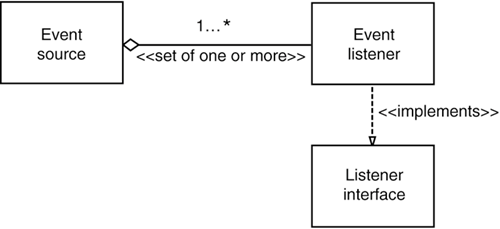Semantic and Low-Level Events in the AWT
| The AWT makes a useful distinction between low-level and semantic events. A semantic event is one that expresses what the user is doing, such as "clicking that button"; hence, an ActionEvent is a semantic event. Low-level events are those events that make this possible. In the case of a button click, this is a mouse down, a series of mouse moves, and a mouse up (but only if the mouse up is inside the button area). Or it might be a keystroke, which happens if the user selects the button with the TAB key and then activates it with the space bar. Similarly, adjusting a scrollbar is a semantic event, but dragging the mouse is a low-level event. Here are the most commonly used semantic event classes in the java.awt.event package:
Five low-level event classes are commonly used:
Table 8-1 shows the most important AWT listener interfaces, events, and event sources.
Event Handling SummaryLet's go over the event delegation mechanism one more time to make sure that you understand the relationship between event classes, listener interfaces, and adapter classes. Event sources are user interface components, windows, and menus. The operating system notifies an event source about interesting activities, such as mouse moves and keystrokes. The event source describes the nature of the event in an event object. It also keeps a set of listeners objects that want to be called when the event happens (see Figure 8-6). The event source then calls the appropriate method of the listener interface to deliver information about the event to the various listeners. The source does this by passing the appropriate event object to the method in the listener class. The listener analyzes the event object to find out more about the event. For example, you can use the getSource method to find out the source, or the getX and getY methods of the MouseEvent class to find out the current location of the mouse. Figure 8-6. Relationship between event sources and listeners Note that there are separate MouseListener and MouseMotionListener interfaces. This is done for efficiency there are a lot of mouse events as the user moves the mouse around, and a listener that just cares about mouse clicks will not be bothered with unwanted mouse moves. All low-level events inherit from ComponentEvent. This class has a method, called getComponent, which reports the component that originated the event; you can use getComponent instead of getSource. The getComponent method returns the same value as getSource, but already cast as a Component. For example, if a key event was fired because of an input into a text field, then getComponent returns a reference to that text field. java.awt.event.ComponentEvent 1.0
|
EAN: 2147483647
Pages: 132
- Using SQL Data Definition Language (DDL) to Create Data Tables and Other Database Objects
- Working with Queries, Expressions, and Aggregate Functions
- Using Data Control Language (DCL) to Setup Database Security
- Creating Indexes for Fast Data Retrieval
- Repairing and Maintaining MS-SQL Server Database Files